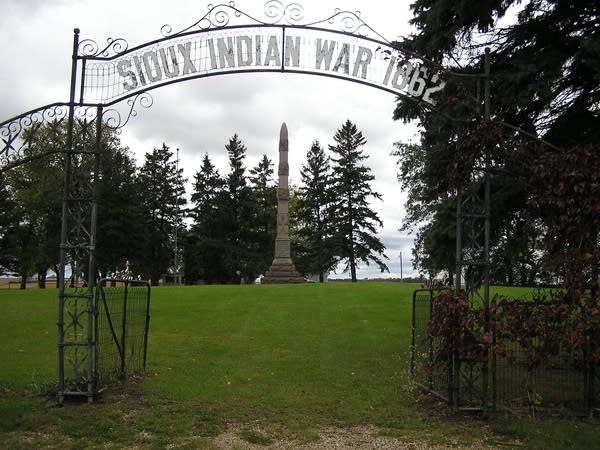Couple wants to preserve historic battle site
Go Deeper.
Create an account or log in to save stories.
Like this?
Thanks for liking this story! We have added it to a list of your favorite stories.

On a cloudy, windy day, John Coulter straddles the past and present on a farm in Yellow Medicine County. A soybean field stretches off to his right, a symbol of what most of the land in this area has become. To his left winds a little stream flanked by trees and prairie.
It's nearly unchanged since it trembled under cannon balls and rifle fire during the Wood Lake battle on Sept. 23, 1862.
Coulter gestures across the soybeans to a clump of trees nearly a mile away.

"Sibley's army was up in here, and the Indians were over here along Wood Lake Creek when the battle erupted," says Coulter.
Turn Up Your Support
MPR News helps you turn down the noise and build shared understanding. Turn up your support for this public resource and keep trusted journalism accessible to all.
Col. Henry Sibley commanded more than 1,500 U.S. soldiers. Awaiting him were half that number of Dakota warriors. The main part of the fighting was on the Coulter land near the winding stream.
"I've been told that there's 14 brave, Dakota warriors still buried in this battlefield here," says Coulter.
Coulter calls this his wife's farm. Muriel Coulter grew up here. She passed on talking to a reporter, asking her husband to do it. John Coulter says the role fits him anyway; he's a history buff and loves to talk. He says he and his wife want to open the land to the public.
This is a really important battle in Minnesota history.
"I had a man from the state historical department walk out here and said, 'Sir, this is hallowed ground.' And I believe it is," says Coulter. "This is where a really important battle in Minnesota history took place. And I would just like to see it protected in the way it is."
The battle is important because it's the final chapter in a defining Minnesota event. The 1862 war lasted about five weeks. It began after the U.S. government broke promises made to Dakota Indians living along the Minnesota River.
After the war, the Dakota were exiled from the state. They ended up in Nebraska, North and South Dakota, even Canada. Soon after the war ended, 38 Dakota were hanged at Mankato, in the nation's largest mass execution. Most historians believe the executed were innocent of any war crimes.
Coulter's nightmare vision is that sometime in the future, the battlefield is sold for housing lots.
"This place needs to be preserved so that everyone's children enjoy this place," says Coulter.

The Coulters want to maintain ownership, but are willing to sign a long-term easement allowing public access. They're working to accomplish that with a group of Minnesota history enthusiasts called the Wood Lake Battlefield Preservation Association.
Association President Tom Hosier says visiting the land is important to anyone interested in the 1862 conflict.
"To feel it, you got to be there," says Hosier. "To walk along the creek, and try to feel what it was like with the prairie grass and that sort of thing. Otherwise you might as well read a book and look at a sign."
The association holds a symposium on Saturday in Granite Falls on the events of 1862, and specifically the Wood Lake battle.
One of those at the symposium will be Elden Lawrence, a member of the Sisseton-Wahpeton tribe in South Dakota. His ancestors were driven out of Minnesota after the conflict, even though they opposed the war and actually helped some settlers escape the bloodshed.
Lawrence says most people have only a superficial knowledge of what happened in 1862. He says opening the battlefield is a part of an educational process that's long overdue.
"There's a natural feeling that you get from things you don't understand, you have a fear for it," says Lawrence. "And if you don't deal with that fear, that fear eventually turns to resentment, and then resentment to hatred. And so you end up hating something, that you can't even explain why you hate it."
At the battle site, John Coulter says besides being historic land the area is also prime wildlife habitat. He says it's sheltered and loaded with food, like apples. He tastes one and pronounces it "good."
Coulter has a foot in each of the worlds which fought here. His mother was part Dakota. His hope is that one day both sides can tell their history on this storied land.




